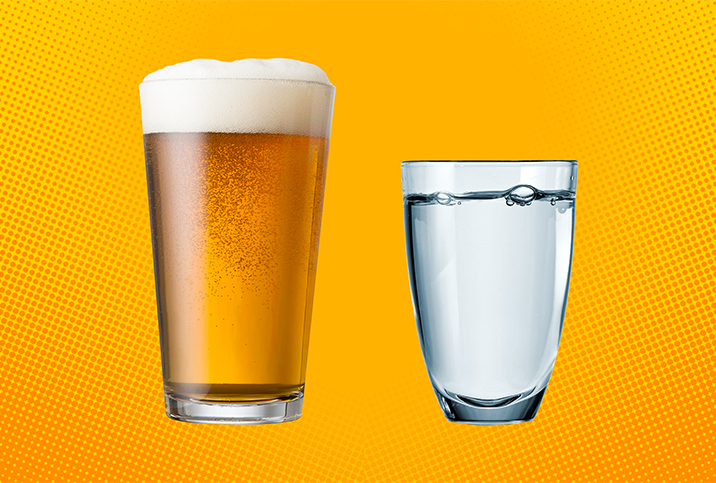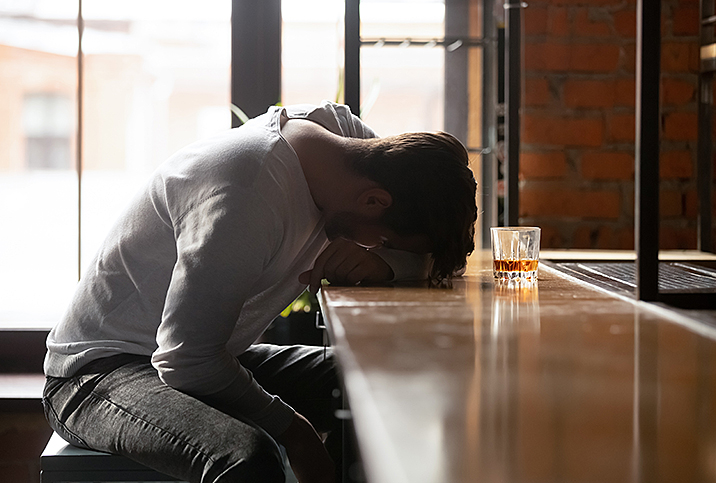Becoming 'Sober Curious'

Perhaps the idea of being "sober curious" began during the inception of the Dry January movement, which was conceived in 2013 by the nonprofit organization Alcohol Change in the United Kingdom.
It was author Ruby Warrington, though, who took the idea of being sober curious and used it to promote alcohol-free club nights as part of the "wellness" movement. Since then, the concept has taken on a life of its own.
She also wrote a book in 2018 titled, "Sober Curious: The Blissful Sleep, Greater Focus, Limitless Presence and Deep Connection Awaiting Us All on the Other Side of Alcohol." In the book, she writes, "when it comes to learning to trust in your own power over your own life, more awareness—meaning less pretending, less hiding, less shame—is always the aim."
In the United States, alcohol is the reason behind an estimated 95,000 preventable deaths annually.
Excessive alcohol consumption can also cause problems during sex, unintended sexual consequences, harm to unborn babies during pregnancy and possibly increased breast cancer risk, and also interfere with mental health medications.
The sober curious movement also welcomes people who are unwilling to give up alcohol altogether. The goal of the movement isn't necessarily to get its participants to abandon alcohol but to offer the means to question and interrogate your relationship with alcohol.
Evaluating your relationship with alcohol
Based in Fredericksburg, Virginia, Erika Wormeley is a licensed professional counselor with Thriveworks who specializes in substance use issues. She explained that being sober curious is the practice of being mindful around alcohol and other legal or socially acceptable substances. She added that this mindfulness is intended to help everyone tune in to their bodies and give them what they need, whether that's rest, more water or less alcohol.
In terms of the mental health benefits, she outlined that saying "no" is a good way to build assertiveness, create better habits and take charge of needs by working on our mind-body connection.
Sobriety, or even just a reduced amount of alcohol consumption, could improve your sex life and relationships, too.
"Being present during intimacy and not under the influence can improve the connection we feel with our partners," Wormeley said. "Drunk sex is not always the best quality."
Being able to access our feelings can help us avoid arguments and miscommunication in our relationships, she added.
The benefits of less booze
Emily Paulson is a certified recovery coach, addiction awareness facilitator and founder of Sober Mom Squad, based in Bend, Oregon. She said the sober curious movement highlights the addictive and dangerous qualities of alcohol, as well as works to inspire healthier life choices.
"It shows how informed consent can inspire change," she explained. "Any decrease in drinking can yield positive health benefits."
Paulson said a sober curious journey starts when people ask themselves what benefits they believe alcohol gives them. Then they can ask if there is a less damaging way to achieve those benefits.
"We get stuck in the cycle of drinking, feeling shame or regret from our drinking, and then drinking again because we believe alcohol is required for life," said Gillian Tietz, the Boston-based host of the "Sober Powered" podcast and a freelancer who writes about addiction.
She added that people who take a break from alcohol may discover less anxiety, better sleep and fewer feelings of guilt. The obsession with alcohol can still be there, even if you moderate it. However, the time spent thinking and evaluating your relationship with alcohol can lead sober curious people to give up imbibing entirely, she said.
Wormeley explained that sober curiosity can offer benefits, such as saving money and avoiding hangovers, for the "average drinker," too. Still, it won't work for people with addiction or dependency issues because sober curiosity can be a slippery slope back into active addiction, she said.
Turning curious into sober curious
In order to start your journey into sober curiosity, Wormeley suggested asking yourself three questions, especially if you're heading out to a party or meeting up with friends:
- Do I want to drink today?
- What am I accomplishing by drinking or not drinking?
- Will it enhance or detract from my enjoyment?
"It might be helpful to ask these questions before you leave for your event and have a game plan in mind, or even some canned responses when alcohol is offered," she said.
Even if it feels awkward at the time, she stressed that your choices can impact people around you—for better or worse. Wormeley said your journey to sobriety could give friends the push they need and provide you with a sober curious buddy, too.
Jenny Stallard, a business coach based in the Cotswolds, England, tried Sober October and found sobriety helped her focus on work, as the lack of hangovers gave her more time to make plans and be creative.
"It's made me reconsider alcohol on weeknights as I can be quick to just open some wine," she added.
Anna Butterworth, the founder of the Ultra Violet Agency in London, first tried being sober curious in 2020 following a weekend of partying in Berlin that culminated in her getting pregnant.
"I find I don't miss alcohol at all but prefer to stay sober," she said, adding that she is open to drinking a couple of times a year but only if it is worth it. "I love being able to remember conversations and wake up the next day with a warm heart instead of a pounding head."
If you want to learn more about the movement, Tietz recommended exposure to "sober content," such as following sober Instagram accounts, joining sober Facebook groups, listening to podcasts and reading books about sobriety. This content can challenge the notion that unless you're the "worst drinker ever," quitting isn't necessary, she said. Additionally, the diversity in backgrounds, voices and experiences can help you relate to others embarking on a journey to sobriety.
"Many of us feel ashamed of things we've done when we were drunk," Tietz said. "But when you hang out in the sober community, you'll find you're not the only one."


















